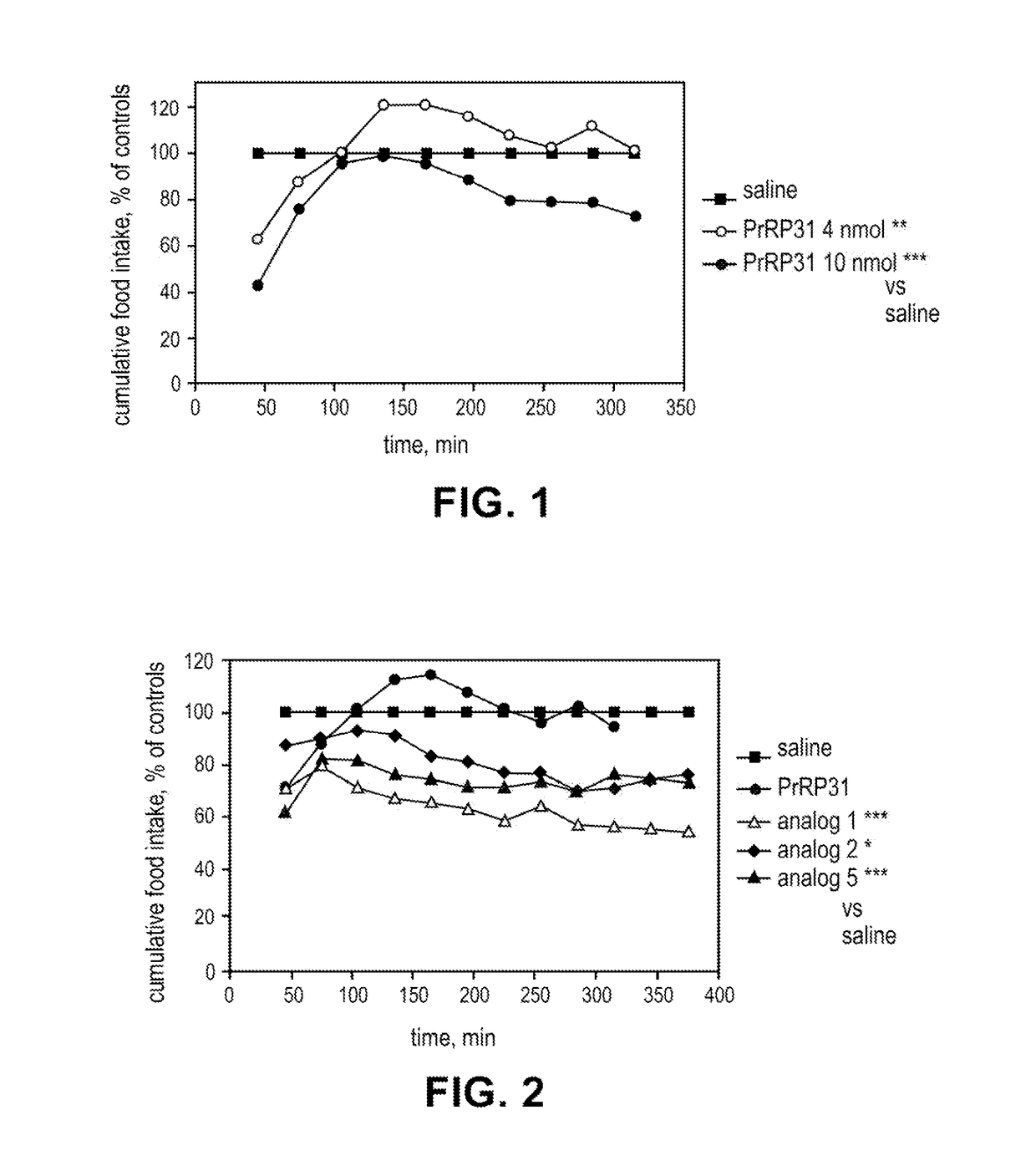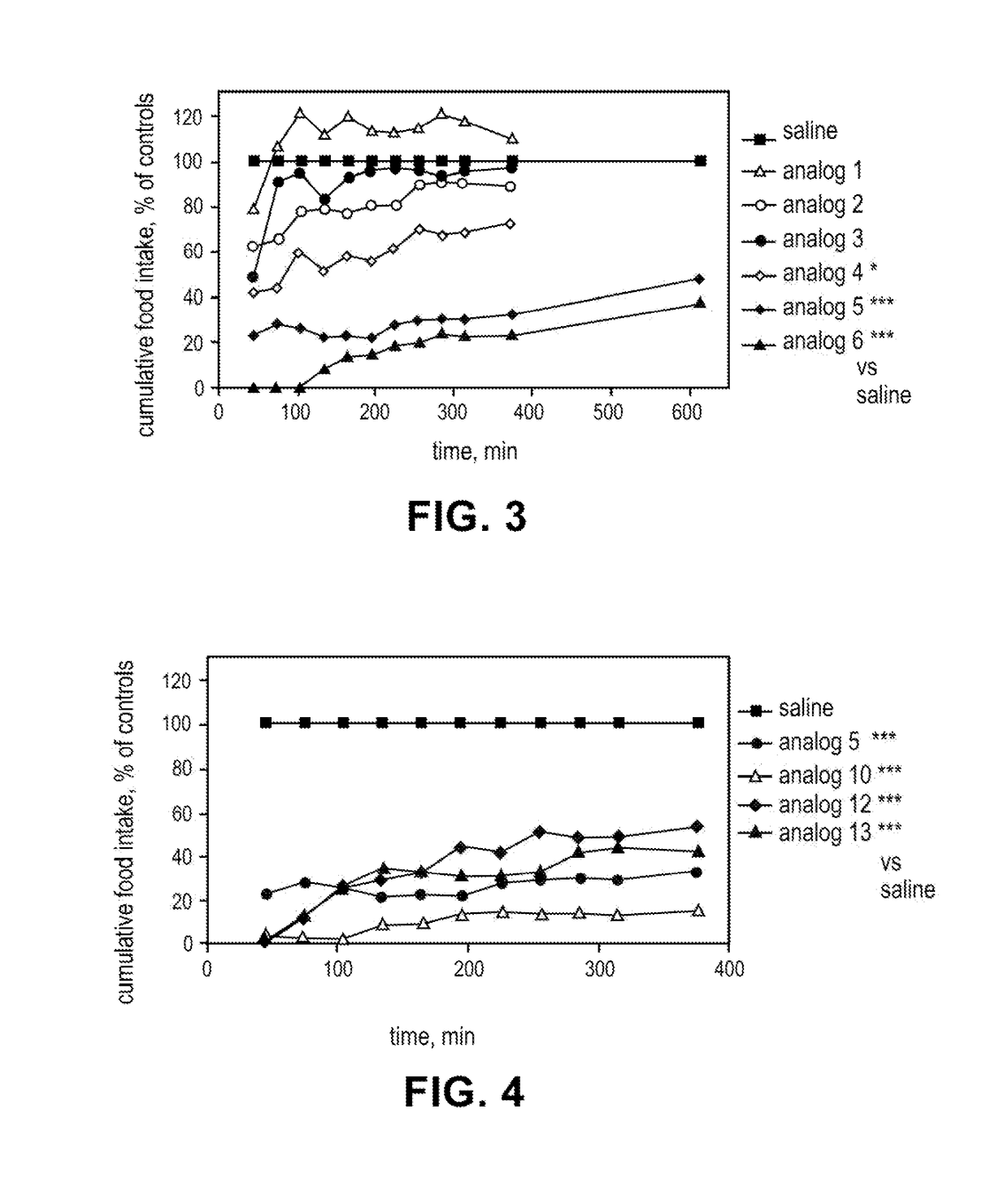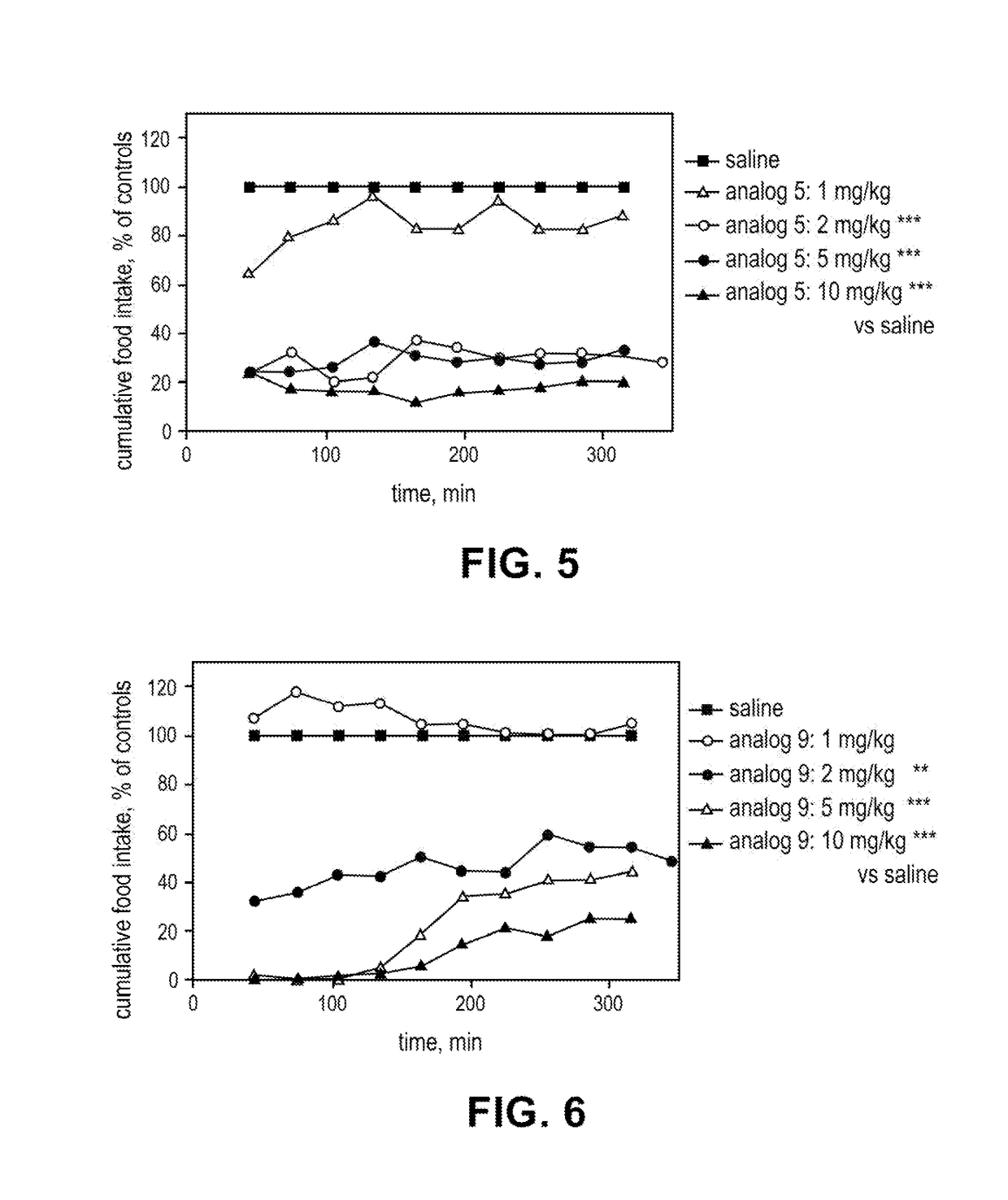Lipidated peptides as anti-obesity agents
a technology of lipidated peptides and anti-obesity agents, which is applied in the direction of peptide/protein ingredients, drug compositions, and metabolic disorders, etc., can solve the problems of increasing obesity, no effective therapies available, and current medications are typically associated with adverse side effects
- Summary
- Abstract
- Description
- Claims
- Application Information
AI Technical Summary
Benefits of technology
Problems solved by technology
Method used
Image
Examples
example 1
of the PrRP Peptides and PrRP Analogs
[0234]The peptides were synthesized using the method of solid phase synthesis according to Maixnerová et al. (Maixnerová, J., et al., “Structure-activity relationship of CART (cocaine- and amphetamine-regulated transcript) peptide fragments,”Peptides, 28:1945-1953, 2007) utilizing the Fmoc strategy on the ABI 433A synthesizer (Applied Biosystems, Foster City, Calif., USA). Lipidation with the appropriate fatty acid was performed before cleaving the peptide off the resin as reported in Maletínská, L., et al., “Characterization of new stable ghrelin analogs with prolonged orexigenic potency,”J Pharmacol Exp Ther, 340:781-786, 2012.
[0235]The peptide PrRP31 was iodinated with Na125I using lodo-Gen (Pierce, Rockford, Ill., USA) according to the published procedure (Maixnerová et al., 2011). Monoiodinated peptide was stored in aliquots at −20° C. and was used up in binding assays within one month.
[0236]Table 1 describes the structures of PrRP31, PrRP20...
example 2
ve Binding Experiments
[0238]Competitive binding experiments were performed according to Motulsky and Neubig (Motulsky, A., et al., “Analyzing radioligand binding data,”Curr Protoc Neurosci, Chapter 7, Unit 7.5, 2002).
[0239]Binding experiments were conducted with rat pituitary cells and CHO cells as follows:
[0240]The rat pituitary cell line RC-4B / C (ATCC, Manassas, USA) was grown on 24-well plates which had their bottom coated with polyethyleneimine. The cells were grown to the optimal density of 300-450 thousand per well. The following agents were used for the experiment: binding buffer (20 mmol·l−1 HEPES, pH 7.4; 118 mmol·l−1 NaCl, 4.7 mmol·l−1 KCl, 5 mmol·l−1 MgCl2, 5.5 mmol·l−1 glucose, 1 mg / ml BSA, 0.1 mg / ml BPTI), unlabelled analogs of PrRP of final concentration within 10−11 to 10−4 mol·l−1, and rat 125I—PrRP31 of final concentration of 10−10 mol·l−1 (Maixnerová et al., 2011).
[0241]CHO cells with transfected human PrRP receptor, GPR10 (Perkin Elmer, USA) were grown on 24-well ...
example 3
Signaling
[0247]RC-4B / C cells, which were used to determine if lipidated PrRP20 analogs are able to initiate the MAPK / ERK1 / 2 signaling pathway, were grown in 6-well plates up to the optimal density of 700-900 cells per well. Seventeen hours before sample harvest, the growth medium was replaced by a serum-free medium lacking epidermal growth factor (EGF). The respective lipidated PrRP analog was added to each well in the final concentration of 10−6 mol·l−1. After a 5 minute incubation at 37° C., the plate was placed on ice and each well was rinsed three times with PBS pH 7.4 (137 mmol·l−1 NaCl, 2.7 mmol·l−1 KCl, 8 mmol·l−1 Na2HPO4.2H2O a 1.76 mmol·l−1 KH2PO4) and cooled to 4° C. The cells were then solubilized in a sample buffer (62.5 mmol·l−1 Tris-HCl pH 6.8, 10% glycerol, 2% SDS, 0.01% bromophenol blue, 5% merkaptoethanol, 50 mmol·l−1 NaF and 1 mmol·l−1 Na3VO4), and collected into microtubes and frozen at −20° C. Samples were collected in at least three independent experiments.
[0248...
PUM
 Login to View More
Login to View More Abstract
Description
Claims
Application Information
 Login to View More
Login to View More - R&D
- Intellectual Property
- Life Sciences
- Materials
- Tech Scout
- Unparalleled Data Quality
- Higher Quality Content
- 60% Fewer Hallucinations
Browse by: Latest US Patents, China's latest patents, Technical Efficacy Thesaurus, Application Domain, Technology Topic, Popular Technical Reports.
© 2025 PatSnap. All rights reserved.Legal|Privacy policy|Modern Slavery Act Transparency Statement|Sitemap|About US| Contact US: help@patsnap.com



